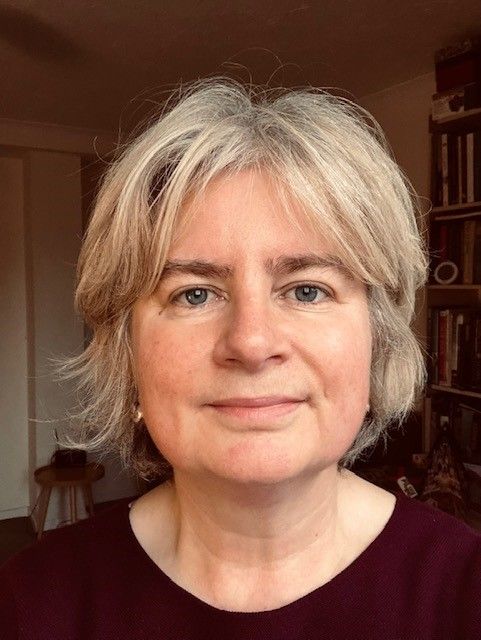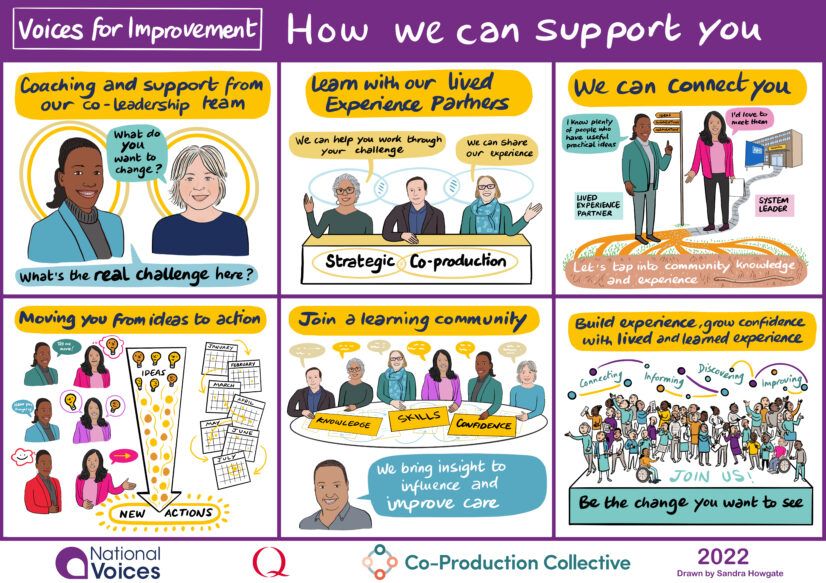
Learning together – How coaching and mentoring skills can reset relationships to improve care
Rachel Matthews
- Voices for Improvement
- Lived experience
- Health inequalities
This event, and our work is made possible by the dedication shown by a growing community of people drawn from across our membership and through our networks. Special thanks extend to the Q Community who funded this work and to the Voices for Improvement Advisory Group who have offered insight and constructive challenge right from the start of Voices for Improvement. We appreciated Peter Johnson sharing his experience as an advisory group member at the event.
What I noticed last week is the wealth of experience, insight and resourcefulness that exists across the Voluntary, Community and Social Enterprise sector and the communities it serves. We are thankful to Helen Hassell, Richard Chapman, Richard Falvey, Samantha-Jane Ofoegbu and Sandra Jayacodi from our first two coaching and mentoring skills programme cohorts for thoughtfully sharing their reflections on what this opportunity means for them and to Shahana Ramsden at NHS England who described what it is like to receive coaching from a Lived Experience Partner in Keymn Whervin.
With help from Lizzie Cain at the Co-Production Collective, we are now drawing together the learning from our work. Our learning partnership has helped us to understand the value that people with lived experience bring to organisations and situations especially by those who do not get the opportunity to work closely with system leaders and decision-makers.
Ahead of the publication of our learning report, I’d like to take this opportunity to share nine aspects of learning with you. We invite you to consider what they mean in practice, how do they translate into something that can be seen, heard and felt?
- Be flexible – truly start from where people are at and what helps them to participate. Be prepared to ask what somebody needs, rip up the original plan and make a new one together.
- Build from existing experience – what can be respected and learned from the experience people bring?
- Commit to tacking difficult issues – there are many uncomfortable issues that are easier to dismiss and ignore than to look at directly. These won’t disappear. The first step is to name them and acknowledge that they exist. Get help from people with more experience to tackle them.
- Bring together lived and learned experience – people bring a wealth of perspectives. Understand what lies at the heart of them. Experience can be through being personally impacted by a situation, condition or issue, or through learning, education and training. They are complementary and offer greater insight if brought together.
- Invest in shared learning – learning together provides the opportunity to exchange knowledge, skills and experience.
- Build in regular reflection and be ready to adapt – it’s easy to run past situations in a fast-paced world. Take time to notice and process: what’s happening? What are we noticing? What’s changing?
- Offer coaching and mentoring – what is it like to be with someone who helps you think through a situation rather than telling you what to do? A coach actively listens and asks questions, so people discover insight and solutions for themselves. It gives them space to breathe and to grow their confidence. A mentor can share direct experience to guide and support.
- Invite fresh insight – notice if permission is given to invite a different perspective. Does everybody feel the same way? Be curious to understand if people think differently.
- Address inequality and improve health outcomes – there is sufficient evidence to show that health outcomes are not the same across a whole range of different characteristics. It is only through understanding what gets in the way for people that we will have a chance to address discrimination and inequality.
Working alongside people in this way is more interesting, rewarding and fun. It’s creative and engaging and helps to get underneath tough issues. The coaching and mentoring skills our Lived Experience Partners use deepens understanding and promotes concrete action to improve care especially for people and communities where health outcomes are disproportionately impacting the ability to get on with life.
Curious to know more? If you’d like to invest in the growth of this community and your personal and organisational learning, we want to hear from you.
Watch a recording of last week’s event here
